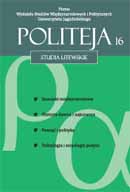Czy sowiecki eksperyment rzeczywiście się skończył? Historiografia, miejsca pamięci, elita polityczna
Is Soviet experiment really over? Historiography, places of memory, political elite
Author(s): Aurimas ŠvedasSubject(s): Politics / Political Sciences
Published by: KSIĘGARNIA AKADEMICKA Sp. z o.o.
Summary/Abstract: This article analyses the Soviet experiment in recreating the great narrative of history in Lithuanian society. While seeking to demolish the traditional interpretative context of the Lithuanian society, which was established during the interwar period (the great narrative on the nation’s past, present and future, the system of values, traditional social institutions etc.), the founders and apologists of the Soviet system tried to “re -educate” the old political, academic and cultural elite. Simultaneously they tried to form the new elite and foster their artistic and intellectual activity in order to create a new great narrative on the Lithuanian nation’s past, present and future and to present society with the works of art which could help to build the Soviet interpretative context and to ensure its vitality. As noted in this article, the emotional and notional accents of the new great narrative, which existed for almost fifty years of the Soviet epoch, did not manage to overshadow the interwar narrative on the Lithuanian nation’s past. Thus, the Soviet epoch “conserved” the great narrative of the interwar in the consciousness of society; there were neither thematic subjects nor intellectual capacities to create alternatives for them. Furthermore, the ideologists of the Soviet epoch ingeniously exhausted the notional accents of the interwar narrative related to the anti Polish, anti -German, antichristian attitude; in such a way they contributed to the formation of resistant identities that are still visible in the contemporary Lithuanian society. Some works of art that were produced by the cultural elite during the Soviet epoch survived the break of 1990 and the post -Soviet transformation processes to become the sites of memory for the Lithuanian society. Some of them (e.g., the film Nobody Wanted To Die by Vytautas Žalakevičius, 1965) have ensured the survival of the images that were important for the Soviet ideologists (such as the presentation of guerrilla war against the Soviet occupants as “fratricidal war”) in the historical memory of the society; other works of art, such as the dramatic trilogy Mindaugas, Mažvydas, Katedra (1968 -1977), succeeded in liberating themselves from the notional and emotional canons imposed by the epoch and helped to fortify the national identity back in the Soviet epoch and also established symbiotic relations with the newly constructed great narrative after 1990. The socio-political elite of the Soviet epoch often used to hide the lack of ideological and intellectual self -identity behind the ideologically correct “masks of thinking”. The essential shift of political elite which failed to emerge in Lithuania during the last twenty years allows us to regard the dominant politics of today (which is not based on values) as a significant sequel of the Soviet experiment, where individuals and social groups wear “masks of thinking” and are able to conform to the new favourable conjuncture.
Journal: Politeja - Pismo Wydziału Studiów Międzynarodowych i Politycznych Uniwersytetu Jagiellońskiego
- Issue Year: 8/2011
- Issue No: 16
- Page Range: 251-264
- Page Count: 14
- Language: Polish

